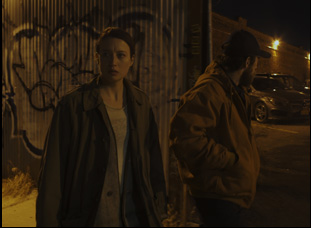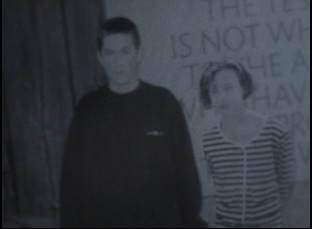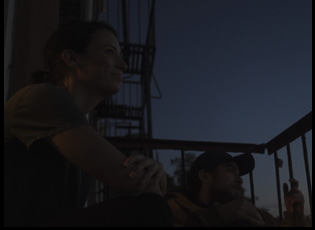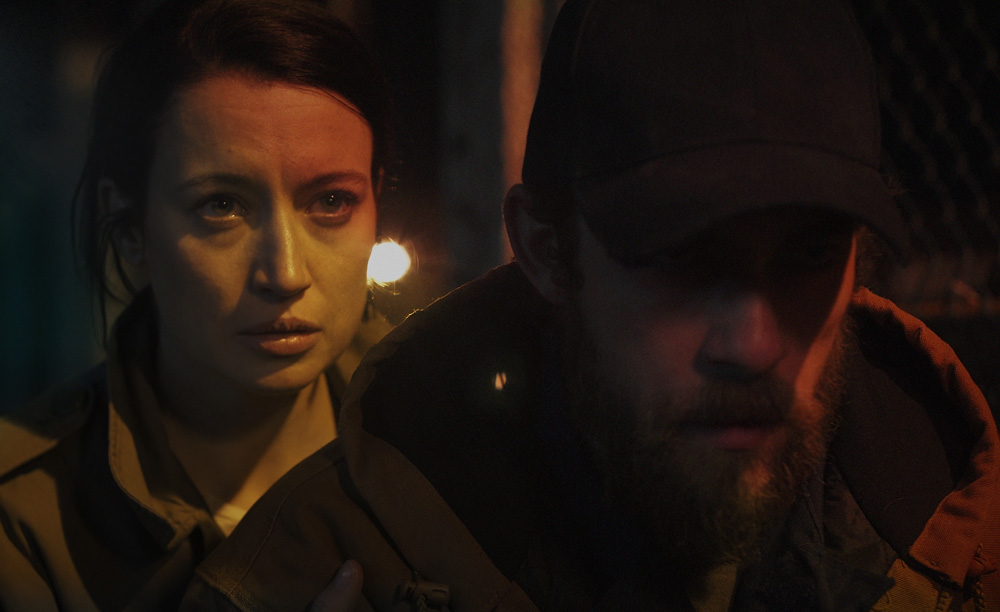“Things came up on your application,” Daphne (Libby Ewing) is told as she’s applying for an adoption in “When I Consume You,” a full circle event for the young woman and her brother Wilson (Evan Dumouchel) when the desire to take care of a child stems from the fact that they weren’t looked over themselves all that well when they were young. A chance to give a childhood to another that they couldn’t have themselves may be noble, but it doesn’t appear that way to the person handling the paperwork, who only knows of Daphne through the incident report she has in front of her, unable to look past the document’s bold type and protestations that Daphne is five years sober to give her stamp of approval to placing a foster child in their custody.
The notion that the siblings are doomed to repeat a cycle that began well before they were born without any reasonable way to change it takes on an interesting wrinkle in the latest film from Perry Blackshear, who has a way of accentuating the natural part of supernatural thrillers in such arresting films as “The Siren” and “They Look Like People,” where past trauma can often take physical shape. In “When I Consume You,” it arrives in the form of a stalker (MacLeod Andrews) who Wilson comes to believe has taken the life of his sister upon finding her dead, yet remains in contact with her as she comes alive in his dreams, guiding him towards taking revenge. However, far from some traditional hunt for vigilante justice, Blackshear is clearly after something deeper when Wilson’s view of the world is tainted by his pain, putting into question whether Daphne was murdered or died by her own hand and if he’s embarking on a quixotic attempt to save her soul, or even his.
The credits list on Blackshear’s films are often not much longer than the cast involved, with the writer/director handling his own cinematography and asking whichever actor isn’t in the scene to hold the boom mic, and while it gives him freedom to pursue original ideas, the minimalism of his shoots has actually had its aesthetic benefits as well, often becoming harrowing as the walls inevitably close in on his subjects and they try to find their way out of the dark emotionally, if not literally. “When I Consume You” became a bright light at last year’s Fantasia Fest and after a year traveling to genre fests, it recently arrived on VOD and to mark the occasion, Blackshear spoke about the inspiration behind the film, bringing a new member into his tight-knit company of collaborators in Ewing and filming from dusk to dawn in Brooklyn where the jump scares happened off-screen.

I guess there was a version of this that was a long time ago and it was always about this second adolescence of a character that has lived one way their whole life. They were very soft and sweet and nice and then something terrible happened when they were an adult and they had this decision where the way they grew up and [how] they learned to be didn’t work anymore and they had to change totally. Then they went too far or they didn’t know how to do that change or it went wrong, [like] a second adolescence, so that was where it started. There was always a brother-sister relationship — that’s what I cared about the most, [seeing] different ways of facing the troubles of the world and then the understanding how to change when you hit adulthood and it gets really hard. You have to figure out a new way of being.
Structurally, it seems like you cracked the code on portraying the cyclical nature of trauma in a subtle way. Did it come organically?
I have people who work in this field and people who have gone through things like this that I love in my life, so whenever you’re dealing with heavy material like this, I care a lot about making sure that I do it right and not being exploitative and try to understand it as much as I can. There was definitely a lot that went into it. I also wanted to make what these two characters went through pretty awful when they were young and how it affects them now as adults, but what I hoped was people could echolocate the trauma. You wouldn’t see the thing itself, but you could see all that it caused,and how you have to deal with it everyday. Not everybody has gone through what these characters have, but we all take stuff from when we’re younger and as an adult, I don’t know if this has happened to you, but I’m about to hit 40 and all my friends are having kids, getting married and all these things are starting to come out that they never had to deal with before, things they managed to dodge their whole lives and now have to kind of face. Some of it can be pretty intense, so with all this stuff inside you, when you have a family of your own or you grow to a certain age, it all starts to catch up to you. So the movie was about turning backwards and facing all this stuff, whether it’s as difficult as what these two characters went through or just certain lower key things that if you want to be the dad you want to be you have to deal with.
I imagine Evan might’ve been in mind since he’s been in your films before, but what was it like to bring in Libby and create that brother-sister dynamic?
I’m so glad you brought up Libby because even though Libby is technically new to the team, it feels like that one season of “Buffy” where she had a sister and that sister isn’t in the credits [for the other seasons], but she always had a sister. I shot this movie four years ago and then what happened was I got a TV show that I was working on for two years and now it’s back in development, but that interrupted the movie, so there was this big gap and it’s like Libby has always been part of the team, [and we’re] retconning because she’s amazing. [laughs] She’s good friends with Evan and we really put her through the ringer up top — a lot of interviews and I did so many Zoom calls with her when Zoom was new at the time, because we work in such a specific way. You have to be willing to roll up your sleeves and there’s a bunch of good things about it, like you get a lot of freedom and there’s so little time messing with technicals [on set] and it’s just a lot of acting…but it’s also a lot of acting. [laughs]
We wanted the right person who was down to do all this stuff and throw themselves into the filmmaker part of it and Libby was just amazing. Afterwards, she made a web series because she was like, “If these guys could do this, I could do this,” and is now directing herself, so it was great to bring her into the fold and Evan and Libby actually lived together during the shooting of it and we shot it in order, so they got very, very close, almost bickering like [brother and sister], “How could you chew your food that way?” They were close beforehand, but the intensity of the movie and the intimacy of how we shoot brought them together and making a movie like we do, almost shooting it like a documentary with the cast and crew is so difficult that you really have to take advantage of the things that are good about it like the intimacy and the camaraderie that you get.

I do the camera stuff on my own and the actors learn about it later. [laughs] But the intimacy and the point of view that you’re talking about was extremely intentional, for better or worse because I think it can be intense to live through. I took inspiration from Lodge Kerrigan’s work and then “Requiem for a Dream,” that stunned me. I didn’t know that a movie could place you in an altered state or into the experience of a character totally unlike yourself. The goal was really to use the camera and sound to be inside of Wilson’s experience, which is sometimes really miserable, so full of anxiety and obsession and inability to deal with the outside world. That one scene when Daphne is on the street with a lot of drugs in her system and is really paranoid, I’ve never been quite in that situation, but when I was in my early twenties, I’ve been very, very, very drunk in New York City before and you certainly feel like nothing makes any sense. It’s very frightening actually, so I tried to recreate what that was like, and I love doing experiential stuff like we did in “They Look Like People” and “The Siren,” [imagining] when you have obsession and hunger for something, so I find that really exciting as a viewer and tried to work on that in the film.
When this is shot in Greenpoint in the wee morning hours, were you actually bumping into some of those people?
Well, you have to be pretty cool and roll with it. There’s all sorts of crazy people and under the bridge, there were like savage raccoons that did not give a fuck. We were in their face and they were like, “Fuck you.” They would not leave. [laughs] So yeah, New York at three am, four am gets weird, definitely. Some of the wandering around scenes that are all at night, those are pretty easy, but the fight scenes that were all done at 4 a.m. on these alleyways. There was one scene late on that was at night, more in the middle of things, and that was tough because you’ve got cars going by. This is a random tangent, but I had a bad back injury and there was some time I thought I might be paralyzed and this yoga saved me and one of the things they kept saying was when there were these loud cars going by the yoga studio and everyone was [thrusting] and the teacher would be like, “Don’t let anything bother you. That’s not your goal. It’s not to have a perfect life, it’s to be able to be at peace anyway,” which is hard for me, but to answer your question, I think sometimes that stuff would really force us to focus. Then what would happen is one of those karmic things where if we were able to roll with it, then it opened up and we had an hour where no one would walk by. It was magical. [laughs]

“Let go of” is a great phrase. I feel like more than any film, my id wrote this film. It was in a dark time for me and some people that I really cared about and it feels like a sort of exorcism. My colleagues and I love making personal films and when we make it this way, it must become personal because of the intimacy of the production, but we were talking the difference between a journal entry and a love letter. Journal entries are just for you — no one else sees that shit, maybe — but love letters are just as intimate but they’re for people you love, so we wanted to make sure this felt like a love letter to people in my life and alsothe times of my own life where I went through the darkest periods. We’re so proud of it, we care about these characters so much and we’re so happy they went off to college and are now out in the world and it’s a little scary because it’s like a parent where you’re like, “Oh God, I hope you do okay. But it’s out of the nest now and we have so many other projects we’re working on now, but it’s exciting to see it out in the world.
“When I Consume You” is now available on a variety of digital platforms.




